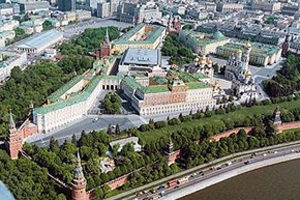Nicolai Petro: “New book by Marlene Laruelle [‘Is Russia Fascist? Unraveling Propaganda East and West’]”

Subject: New book by Marlene Laruelle
Date: Sun, 28 Feb 2021
From: Nicolai Petro <npetro@uri.edu>
Dear David,
I think JRL readers would be interested to learn about Marlene Laruelle’s new book. Here is an excerpt from the Cornell web page:
Is Russia Fascist? Unraveling Propaganda East and West
by Marlene Laruelle | Hardcover | Cornell University Press
Publication date: 03/15/2021 Pages: 264
Clipped from: cornellpress.cornell.edu/book/9781501754135/is-russia-fascist/#bookTabs=1
In Is Russia Fascist?, Marlene Laruelle argues that the charge of “fascism” has become a strategic narrative of the current world order. Vladimir Putin’s regime has increasingly been accused of embracing fascism, supposedly evidenced by Russia’s annexation of Crimea, its historical revisionism, attacks on liberal democratic values, and its support for far-right movements in Europe. But at the same time Russia has branded itself as the world’s preeminent antifascist power because of its sacrifices during the Second World War while it has also emphasized how opponents to the Soviet Union in Central and Eastern Europe collaborated with Nazi Germany.
Laruelle closely analyzes accusations of fascism toward Russia, soberly assessing both their origins and their accuracy. By labeling ideological opponents as fascist, regardless of their actual values or actions, geopolitical rivals are able to frame their own vision of the world and claim the moral high ground. Through a detailed examination of the Russian domestic scene and the Kremlin’s foreign policy rationales, Laruelle disentangles the foundation for, meaning, and validity of accusations of fascism in and around Russia. Is Russia Fascist? shows that the efforts to label opponents as fascist is ultimately an attempt to determine the role of Russia in Europe’s future.
“Marlene Laruelle is one of the—if not the most—preeminent scholars working on the Russian far right. She has produced numerous works of immense authority, and continues that pattern in Is Russia Fascist?”
Richard Arnold, Muskingum University, author of Russian Nationalism and Ethnic Violence
“Marlene Laruelle is one of the world’s leading experts on Russian nationalist and far-right movements. This book provides an authoritative examination of discourses about fascism with respect to Russia. She deftly and with great clarity illuminates the use and abuse of the label of ‘fascism,’ both by the Russian state and about Putin’s Russia. The real issue at stake is a struggle to define the future of Europe and Russia’s place in it. A dazzling contribution.”
Brian D. Taylor, The Maxwell School of Syracuse University, author of The Code of Putinism
“In Is Russia Fascist? Marlene Laruelle offers a nuanced and important contribution to our understanding of fascism and how the concept plays out in Russia. Laruelle is consistently one of the most insightful scholars of national identity in Russia and Eurasia, and her new book does not disappoint. It will be required reading for anyone who seeks to understand the narrative of fascism in Europe and Eurasia today.”
Yoshiko Herrera, University of Wisconsin, author of Imagined Economies
“The idea that contemporary Russia is fascist is as bizarre as it is tenacious. In her wide-ranging book, Marlène Laruelle elegantly debunks it. She does so by portraying some of Russia’s competing and interconnected ideological ecosystems and showing how Putin’s illiberal regime seeks to co-opt and balance a wide variety of ideas and interests in the name of stability.”
Mischa Gabowitsch, Einstein Forum, author of Protest in Putin’s Russia
“A dazzling tour de force! In addition to its compelling argument about the bedeviled question of Russian fascism, in an age in which applied—and misapplied—labels can successfully galvanize political movements and initiatives, Is Russia Fascist? lays out a breathtakingly comprehensive exposition of the Kremlin’s and the Russian polity’s variegated imagination, in all its fascinating social, political, and emotional complexity.”
Nina Tumarkin, Wellesley College, author of The Living and the Dead: The Rise and Fall of the Cult of World War II in Russia
Marlene Laruelle is Research Professor of International Affairs and Director of the Institute for European, Russian, and Eurasian Studies at The George Washington University.
Contents
Introduction: Russia and the Symbolic Landscape of Fascism
1. Russia’s “Fascism” or “Illiberalism”?
2. The Soviet Legacy in Thinking about Fascism
3. Antifascism as the Renewed Social Consensus under Putin
4. International Memory Wars: Equating the Soviet Union with Nazism
5. The Putin Regime’s Ideological Plurality
6. Russia’s Fascist Thinkers and Doers
7. Russia’s Honeymoon with the European Far Right
8. Why the Russian Regime Is Not Fascist
Conclusion: Russia’s Memory and the Future of Europe
Sincerely,
Nicolai N. Petro
Professor of Political Science
224 Washburn Hall, University of Rhode Island
Kingston, RI 02881 (USA)
